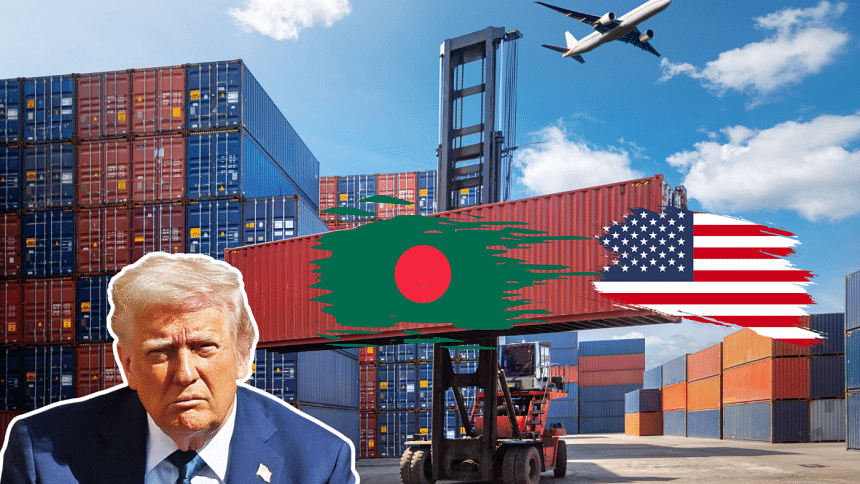Bangladesh eyes 10-20% tariff in final US talks

The Bangladeshi delegation left for the US yesterday to engage in the third and final round of negotiations with the Trump administration, seeking to lower a new tariff rate on the country's products.
The negotiations are scheduled to begin on July 29 and continue until July 31, whereas a 35 percent tariff is set to be imposed on Bangladeshi products entering the American markets from August 1.
"We are hopeful of a much lower tariff rate as the negotiations held to date have been in a congenial atmosphere," Commerce Secretary Mahbubur Rahman told The Daily Star over the phone before leaving the country.
"I see a positive sign in the negotiations," he said.
The tariff rate is likely to be in the range of 10 percent to 20 percent, as has been the case for some countries that have been able to avail revised tariff rates, he added.
For instance, Vietnam was able to settle on 20 percent, Indonesia and the Philippines 19 percent, Japan 15 percent, the UK 10 percent, and the European Union (EU) 15 percent.
Bangladesh has also revised its negotiation strategies, such as offering to buy 25 US-made aircraft instead of 14, he said.
Moreover, Bangladesh has already signed agreements with US suppliers to buy 3.5 million tonnes of wheat over the next five years. Another agreement was signed to import liquefied natural gas (LNG) from the US.
The strategy is aimed at reducing the gap in bilateral trade, which is very much tilted towards Bangladesh.
Regarding buying more aircraft, the commerce secretary said that apart from reducing the trade gap to influence a tariff reduction, Bangladesh needs to build up its aircraft fleet for the future.
Moreover, Boeing's waiting list for the delivery of aircraft is already long, and Bangladesh may have to wait a really long time if the orders are not placed now, he said.
For instance, Vietnam has already sought 100 Boeing aircraft, while Indonesia has sought 50, he added.
The agreements for the purchases are flexible, as the products can be availed even at a date later than that initially agreed upon, added Rahman.
However, it is expected that Bangladesh will eventually benefit from these agreements, as the goods will meet demand, he said.
For instance, the local production of wheat is not enough to meet demand, and Bangladesh is dependent on imported wheat. Now the US will be a major source for wheat imports, he said.
One garment exporter aiding the delegation as a private sector representative, asking not to be named, said, "I don't think we will get anything less than 25 percent, it's my gut feeling."
Zaidi Sattar, chairman of the Policy Research Institute of Bangladesh (PRI), said Bangladesh eventually turned into a major garment exporter to the US market over the years, as the latter does not produce its own garments.
But now the exports will depend on whether Bangladesh can sign a good tariff deal with the US, he said.
For Bangladesh, a 20 percent tariff would be better, he said.
Vietnam was able to attain 20 percent, but if any of its goods are found to be transhipped from China, a 40 percent tariff will be imposed, said Sattar.
Vietnam imports a lot of Chinese raw materials, for which the US might ultimately impose the 40 percent tariff on its products, he said.
In that case, Bangladesh may enjoy a bit of a competitive edge with its 20 percent duty, he said.
"I am hopeful from the optimism of the negotiators. The tariff rate for Bangladesh may be more than 10 percent and at most 20 percent," the PRI chairman also said.
Masrur Reaz, chairman of Policy Exchange Bangladesh, said a deal could be reached at 15 percent, and it would be a very positive deal for Bangladesh.
"I am hopeful and optimistic after the second round of negotiations, as Bangladesh is now much more prepared and strategic," he said.

 For all latest news, follow The Daily Star's Google News channel.
For all latest news, follow The Daily Star's Google News channel. 





Comments